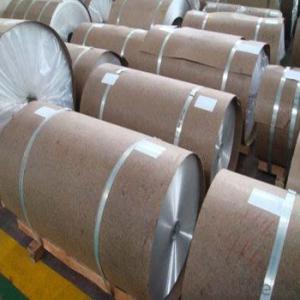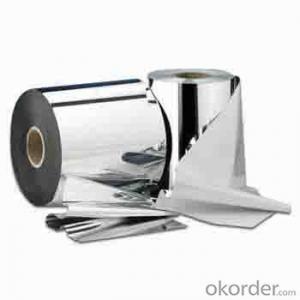Aluminum Direct Casting DC Coils and Rolls
- Loading Port:
- Shanghai
- Payment Terms:
- TT or LC
- Min Order Qty:
- 50 m.t.
- Supply Capability:
- 50000 m.t./month
OKorder Service Pledge
OKorder Financial Service
You Might Also Like
1.Specification
ALUMINIUM COIL
ALLOY: AA1***
AA3***
AA5***
TEMPER: H14 H16 H18 H22 H24 H26 H32 O/F
THICKNESS:0.03MM-3.0MM
WIDTH: 30MM-1700MM
COATING: PE(POLYESTER),PVDF,EPOXY
STANDARD: GB/T 17748-1999
2.Description
In Europe aluminium experiences high rates of recycling, ranging from 42% of beverage cans, 85% of
construction materials and 95% of transport vehicles.Recycled aluminium is known as secondary aluminium, but maintains the same physical properties as primary aluminium. Secondary aluminium is produced in a wide range of formats and is employed in 80% of alloy injections. Another important use is for extrusion.
White dross from primary aluminium production and from secondary recycling operations still contains useful quantities of aluminium that can be extracted industrially.The process produces aluminium billets, together with a highly complex waste material. This waste is difficult to manage. It reacts with water, releasing a mixture of gases (including, among others, hydrogen, acetylene, and ammonia), which spontaneously ignites on contact with air;contact with damp air results in the release of copious quantities of ammonia
gas. Despite these difficulties, the waste has found use as a filler in asphalt and concrete.
3.Why you can choose us?
We can promise the best quality and price!
4.Pictures
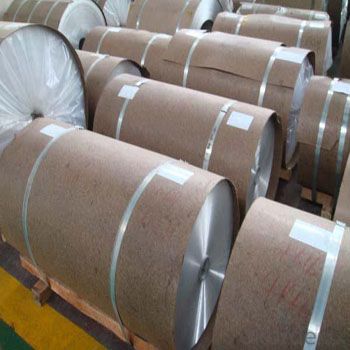
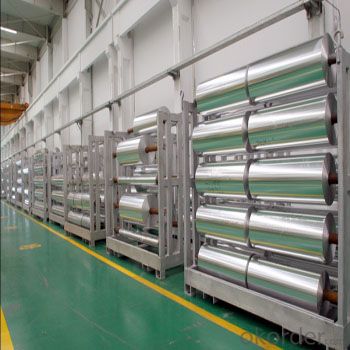
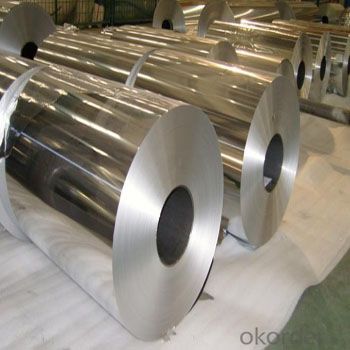
5.FAQ:
1)what is aluminum?
Aluminium (or aluminum; see spelling differences) is a chemical element in the boron group with symbol Al and atomic number 13. It is a silvery white, soft, nonmagnetic, ductile metal. Aluminium is the third most abundant element (after oxygen and silicon), and the most abundant metal in the Earth's crust. It makes up about 8% by weight of the Earth's solid surface.
Aluminium metal is so chemically reactive that native specimens are rare and limited to extreme reducing environments. Instead, it is found combined in over 270 different minerals.The chief ore of aluminium is bauxite.
2)What's kind of payment term we can supply?
CIF,CFR, FOB and other.
3)Can we supply samples?
Yes, we can!
- Q:Hi, I have a large bag of aluminium sulfate that I would like to use to turn my hydrangeas blue but there are no instructions on the pack, can anyone tell me how much I need (mixed with water)
- I usually sprinkle about 1/4 cup around the base of the plant and water it in. This must be done before flowers appear.
- Q:What are the different slitting options for aluminum coils?
- There are several different slitting options available for aluminum coils, depending on the specific requirements and end use of the material. Some of the commonly used slitting options for aluminum coils include: 1. Single Slit: This is the most basic and widely used slitting option, where the aluminum coil is cut into two narrower coils with a single cut along the center. 2. Double Slit: In this option, the aluminum coil is cut into two narrower coils with two parallel cuts along the center, resulting in smaller widths for each coil. 3. Multi-Slit: This option involves cutting the aluminum coil into multiple narrower coils with multiple parallel cuts along the center. It allows for the production of several smaller coils from a single wider coil. 4. Ribbon Slit: This slitting option is used when the aluminum coil needs to be slit into very thin strips, often used in applications such as electrical wiring or packaging. 5. Oscillate Slit: This option is suitable for applications that require varying widths of aluminum strips. The coil is slit in a back-and-forth motion, allowing for flexibility in producing different widths. 6. Custom Slitting: Depending on the specific needs of a project, custom slitting options can be implemented. This involves tailoring the slitting process to achieve unique widths, lengths, or shapes of aluminum strips. It is important to consider the desired application, required dimensions, and the capabilities of the slitting equipment when choosing the appropriate slitting option for aluminum coils.
- Q:Are aluminum coils suitable for heat exchangers?
- Aluminum coils are indeed a fitting choice for heat exchangers. This is because aluminum possesses exceptional thermal conductivity, making it highly efficient and effective in transferring heat between mediums. Its ability to swiftly transfer heat from one medium to another is particularly advantageous for heat exchangers that require efficient heat transfer. Furthermore, aluminum coils are lightweight, resistant to corrosion, and boast excellent durability. These qualities contribute to their popularity in a wide range of applications, including heat exchangers. The corrosion resistance of aluminum ensures that the coils can endure harsh environments and prevent the occurrence of rust or corrosion, thereby prolonging the heat exchanger's lifespan. Moreover, aluminum coils are easily moldable and can be shaped into various forms, allowing for flexibility in designing and constructing heat exchangers. This adaptability makes them suitable for a diverse array of applications, such as HVAC systems, refrigeration units, and automotive cooling systems. In conclusion, the high thermal conductivity, lightweight nature, corrosion resistance, durability, and versatility of aluminum coils make them well-suited for heat exchangers. These properties establish aluminum coils as an excellent choice for achieving efficient heat transfer in numerous industries.
- Q:What is the weight of aluminum coils?
- The weight of aluminum coils can vary depending on the specific dimensions and thickness of the coils. However, on average, aluminum coils can range in weight from a few hundred pounds to several thousand pounds. It is important to note that the weight of aluminum coils can also be influenced by factors such as the alloy composition and any additional coatings or treatments applied to the coils.
- Q:Are aluminum coils suitable for aerospace applications?
- Indeed, aluminum coils are well-suited for aerospace applications. The aerospace industry extensively employs aluminum owing to its exceptional characteristics, including its lightweight nature, high strength-to-weight ratio, resistance to corrosion, and commendable thermal conductivity. These attributes render aluminum coils highly suitable for an array of aerospace purposes, encompassing the construction of aircraft structures, wings, fuselage, and engine components. Moreover, the malleability of aluminum coils facilitates their effortless transformation into diverse shapes and sizes, thereby enabling efficient manufacturing and customization. Ultimately, integrating aluminum coils into aerospace applications not only enhances fuel efficiency and diminishes overall weight but also improves performance and durability in demanding environments.
- Q:Can aluminum coils be used in heat exchangers?
- Indeed, heat exchangers can utilize aluminum coils. The utilization of aluminum in heat exchangers is prevalent owing to its exceptional thermal conductivity and resistance to corrosion. Aluminum's remarkable thermal conductivity enables efficient heat transfer, rendering it an optimal substance for heat exchangers. Furthermore, the coils' endurance and functionality in challenging surroundings are guaranteed by aluminum's resistance to corrosion.
- Q:Can aluminum coils be used for decorative purposes?
- Yes, aluminum coils can be used for decorative purposes. They are commonly used in various decorative applications such as trim work, wall panels, ceilings, and decorative accents. Aluminum coils offer versatility in terms of color, texture, and finish, allowing for creative and aesthetically pleasing designs.
- Q:Are aluminum coils suitable for architectural façade systems?
- Indeed, architectural façade systems can indeed make use of aluminum coils. Aluminum is a remarkably adaptable and enduring material; it can be easily molded and manipulated to suit the specific design requirements of a building's façade. It possesses a lightweight structure, is resistant to corrosion, and can endure extreme weather conditions, rendering it an optimal choice for long-lasting exterior applications. Moreover, aluminum coils can be coated with a variety of finishes, such as paint or anodizing, to heighten their aesthetic appeal and provide additional protection against fading or chipping. The pliability and versatility of aluminum coils make them an exceptional choice for architectural façade systems, enabling the creation of imaginative and distinctive designs while maintaining durability and performance.
- Q:What are the different coil leveling options available for aluminum coils?
- There are several different coil leveling options available for aluminum coils, depending on the specific requirements of the application. 1. Roller Leveling: This is a common method used to flatten aluminum coils. It involves passing the coil through a series of rollers that apply pressure to the material, gradually reducing its thickness and leveling out any imperfections. Roller leveling is efficient for achieving flatness and can handle a wide range of coil sizes and thicknesses. 2. Stretch Leveling: This process involves stretching the aluminum coil in a controlled manner to remove any residual stress and improve its flatness. The coil is passed through a series of powered rollers that stretch and elongate the material, resulting in a more level and stable product. Stretch leveling is particularly effective for thicker and wider coils. 3. Tension Leveling: This method uses tension to remove any waviness or unevenness in the aluminum coil. The coil is passed through a series of bridle rolls that apply tension to the material, effectively flattening it out. Tension leveling is commonly used for thinner gauges of aluminum and can handle high-speed processing. 4. Precision Leveling: This is a specialized leveling process that is often used for high-precision applications where extremely flat and uniform coils are required. Precision leveling involves using a combination of roller leveling, stretching, and tensioning techniques to achieve the desired flatness and eliminate any imperfections in the material. This method is commonly used in industries such as aerospace, automotive, and electronics. Overall, the choice of coil leveling option for aluminum coils depends on factors such as the desired flatness, coil thickness, width, and the specific requirements of the application. Each method has its own advantages and limitations, and it is important to select the most appropriate option to ensure the highest quality end product.
- Q:How are aluminum coils used in the production of electronic devices?
- The production of electronic devices heavily relies on aluminum coils, which perform a crucial role. When it comes to manufacturing the internal components of electronic devices like transformers, inductors, and electromagnets, aluminum coils are the go-to material. These coils are formed by winding aluminum wire around a core, creating a compact and efficient conductor for electrical currents. Transformers make use of aluminum coils to transfer electrical energy between circuits. By utilizing electromagnetic induction, these coils allow for voltage transformation. When a varying current flows through one coil, it induces a voltage in another coil. This process is essential in adjusting voltage levels, ensuring efficient power distribution in electronic devices and electrical systems. Inductors, another vital component in electronic devices, are constructed using aluminum coils. These coils resist changes in electrical current and store energy in their magnetic field. Aluminum coils possess low resistance, high conductivity, and the ability to handle high-frequency currents, making them perfect for inductor applications. They find their use in various electronic devices like power supplies, speakers, and filters to control current flow and regulate voltage. Furthermore, aluminum coils are utilized in the production of electromagnets, which are widely employed in electronic devices. The creation of electromagnets involves passing an electric current through a coil to generate a magnetic field. Aluminum coils are preferred due to their lightweight nature and excellent thermal conductivity, enabling efficient dissipation of heat in high-power applications. Moreover, the use of aluminum coils in electronic devices brings several advantages such as cost-effectiveness, lightweight construction, and excellent electromagnetic properties. Aluminum's lightweight characteristic allows for the production of compact and portable electronic devices, enhancing convenience for users. Additionally, its high thermal conductivity ensures efficient heat dissipation, which is critical in preventing overheating and maintaining proper functionality of electronic devices. In conclusion, aluminum coils find extensive usage in the production of electronic devices, serving various applications like transformers, inductors, and electromagnets. Their exceptional electrical conductivity, lightweight construction, and thermal conductivity make them an ideal choice for achieving efficient and reliable performance in electronic devices.
1. Manufacturer Overview |
|
|---|---|
| Location | |
| Year Established | |
| Annual Output Value | |
| Main Markets | |
| Company Certifications | |
2. Manufacturer Certificates |
|
|---|---|
| a) Certification Name | |
| Range | |
| Reference | |
| Validity Period | |
3. Manufacturer Capability |
|
|---|---|
| a)Trade Capacity | |
| Nearest Port | |
| Export Percentage | |
| No.of Employees in Trade Department | |
| Language Spoken: | |
| b)Factory Information | |
| Factory Size: | |
| No. of Production Lines | |
| Contract Manufacturing | |
| Product Price Range | |
Send your message to us
Aluminum Direct Casting DC Coils and Rolls
- Loading Port:
- Shanghai
- Payment Terms:
- TT or LC
- Min Order Qty:
- 50 m.t.
- Supply Capability:
- 50000 m.t./month
OKorder Service Pledge
OKorder Financial Service
Similar products
New products
Hot products
Related keywords
